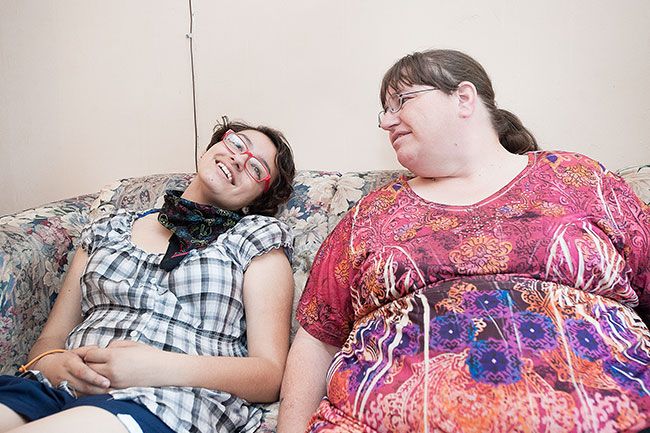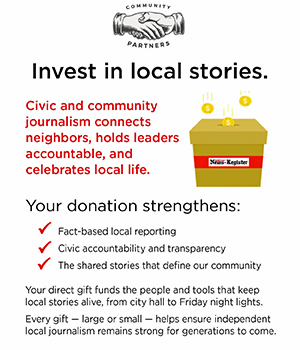Getting help for Heaven

Heaven, 12, and her mom, Hope Arias, tease each other as they talk about how far their relationship has come since working with the county's Family and Youth Program, New Solution.
But she’s experienced a radical turnaround, thanks to Yamhill County’s New Solutions wraparound program and its ability to help her reorient her approach.
Arias’ daughter, Heaven, suffers from a mix of Asperger’s syndrome, oppositional deficiency disorder and ADHD. They afflict her with a litany of compulsions and an anxiety level so high it’s prone to exploding.
After the family relocated to McMinnville two years ago, Heaven’s symptoms began to escalate. Heaven was prone to targeting a younger sister, bruising her with blows.
Out of desperation, Arias eventually called child welfare officials and begged them to remove Heaven from the home.
“That’s a really horrible thing to say, as a mother, but I had to protect one of my daughters from the other one,” she said. “And I didn’t know how to help Heaven.”
She was directed to the county’s New Solutions program, but no relief was forthcoming initially.
“I wondered, ‘What is wrong with you people?’ They probably hated me at mental health, because I would call and accuse them of not helping her,” Arias said.
Then came the breakthrough, and it changed everything.
One day, Heaven’s county therapist pulled Arias aside. She urged Arias to take a whole different approach with her troubled daughter.
“She told me, ‘We need to change Heaven’s environment,’” Arias said. “She said, ‘You need to change how you think and how you parent her.’”
She teared up as she recalled, “That was really hard to hear as a parent, but you know what? Things really started to change after that.
“At first, I was all about them fixing Heaven. I never realized there were things I needed to fix, too.”
For help in setting a new course, Arias said, she read “The Explosive Child” by Ross Greene. Then she took a parenting class offered by Family and Youth.
“I learned to change my mentality,” she said. “For so long, I fought against Heaven instead of working with her. Once I started seeing things differently, things started getting better.
“We’ve seen a significant change in Heaven in the last year. We actually can do things as a family now. It’s wonderful.”
Glancing at her younger daughter playing on the computer, she noted, “It’s been nearly a year since we’ve had any physical outbursts.”
The Arias family is one of 20 assigned to Garret Vander Linden, a care coordinator in the wraparound program. Most of the families are covering their costs through the Oregon Health Plan, but a few have private sector insurance coverage.
Vander Linden said the program provides an intense level of support, as it’s designed for families with major-needs children.
“The cool thing about this wraparound program is the flexibility it offers,” he said. “So we come and meet people in their environment, which is more powerful than sitting across the desk.
“We see kids at their best times, and at their worst. It gives us a better understanding, that’s for sure.”
In addition to coordinating Heaven’s meetings with her support team, and sitting in on them, Vander Linden regularly visits the house to check on her.
“Hope and Heaven are a good example of the kinds of families who come to us when other systems have failed them,” he said. “They’ve really all come a long way.
“The communication in the home has improved dramatically, and Heaven’s aggression level has gone way down. It’s been impressive. I attribute it to having the team and wraparound support, but also I give a lot of credit to Hope and Heaven for taking control of their own treatment.”
Heaven is visiting a friend. She was supposed to be home 20 minutes ago for the meeting with the reporter.
Eventually, she comes bounding in. She flashes a smile and offers a quick “sorry” as she plops down on the coach.
While one aspect of Heaven’s condition is being extremely rigid about her own schedule, to the point of fixation, she can be very casual about her mother’s schedule. That used to infuriate Arias, but she’s learned it’s just part of the package.
Ask why it works one way, but not the other, Vander Linden could only laugh. If he had the answer to that, he said, it would make him a rich man.
That inconsistency speaks to one of Arias’ key challenges in learning to deal with her daughter. It can be hard to tell what part of her behavior stems from her condition and what part from a universal adolescent need to test boundaries.
But Vander Linden said Arias has gotten much more confident in finessing that.
One major goal of the wraparound program is to engage as many positive influences as possible in a youth’s life. So part of Vander Linden’s role is working with other people in Heaven’s life, including her grandparents, siblings and teachers.
“We’re not just doing therapy in an office,” he said. “We know if we can engage teachers, family and friends, we have a much higher rate of success.”
Heaven said one of her biggest problems is dealing with bullying at school. Some people are nice, she said, but some are mean to her. She said she was nervous about talking to the paper, but thought if people understood her better, maybe they would treat her better.
Another challenge for Heaven is dealing with sensory issues. For example, she hates the feel of water on her skin.
Arias didn’t understand that for a long time, making bath times particularly difficult.
Heaven also harbors fixations about getting dressed. She has to put her clothes on in precisely the same order every time, without deviation.
Arias said they used to fight battles every morning over showering and dressing, but after working with New Solutions, she’s developed more cooperative and constructive ways of dealing with her daughter’s compulsions.
“She still has difficulty paying attention, and has to be redirected a million times to put her shoes on,” Arias said. But now that she understands the problem better, she has learned to address it with more patience and enjoy more success.
Arias said one of the biggest parenting challenges that seems to defy solution is dealing with the uninformed judgments of other people, be they friends, relatives or strangers.
“People say, ‘She just needs to be spanked,’ but they just don’t know, they just don’t know what else is going on,” Arias said.
For Heaven, and others like her, she said every stimulus in their environment is amplified — every sight, sound and smell.
“Even sudden flashes of bright light bother her more intensely than most people,” Arias said. “Anything could trigger an instant meltdown, because she has all of this anxiety just under the surface and it’s ready to explode.”
So adding a strong physical and emotional stimulus by administering a spanking would most definitely be counterproductive.
Arias said Heaven has also made enormous progress toward better coping on her end. She has developed an arsenal of new techniques for regulating her emotions.
But she still has to operate as a literal person in a figurative world, which causes stress.
“With Heaven, the world is black and white,” Arias said. “There’s no such thing as gray. So when you tell her something, it’s etched in stone.
“Before working with Family and Youth, I used to battle that all the time. But now I’ve learned to use words like ‘might’ and ‘maybe.’ I’m careful about the promises I make to her, because so much is out of our control.”
She said, “Some people tell me I let my daughter run the whole house. It may look like that from the outside, but it is totally not like that. It’s hard, but I do understand that to people on the outside, who don’t have a child with a disability, things just don’t look the same.”












Comments